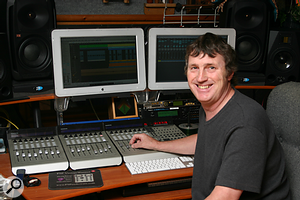How do you go about about achieving lasting success as a singer or band? Is it about short skirts, adolescent looks or badly gelled hair? I don't think so. These things might get you noticed, but how do you keep going for years, decades, even generations and still stay successful? Well, looking at some of the artists who have done just that, I was struck by how many of them have had success all over the world, despite singing in something approximating their native accent, rather than the standardised American style of delivery which is everywhere in mainstream pop music. Want examples?
 Well, the Beatles, and more lately Oasis did OK by not hiding their Liverpool and Manchester roots, while the Kinks, David Bowie and even vintage rockers Pink Floyd delivered their songs Brit-style. These people have been selling records for a long time, so keeping British music British-sounding seems to work, especially on the world market. It has also enabled them to continue selling large numbers of records long after they were old enough to go out without their mums! Other British acts, such as Billy Bragg, the late Ian Dury, Madness and, more recently, Pulp, made even more of their regional accents and were all the better for it. For their fans, singing in this way not only underlined these performers' originality and unwillingness to compromise but also added an air of straightforward honesty to their music.
Well, the Beatles, and more lately Oasis did OK by not hiding their Liverpool and Manchester roots, while the Kinks, David Bowie and even vintage rockers Pink Floyd delivered their songs Brit-style. These people have been selling records for a long time, so keeping British music British-sounding seems to work, especially on the world market. It has also enabled them to continue selling large numbers of records long after they were old enough to go out without their mums! Other British acts, such as Billy Bragg, the late Ian Dury, Madness and, more recently, Pulp, made even more of their regional accents and were all the better for it. For their fans, singing in this way not only underlined these performers' originality and unwillingness to compromise but also added an air of straightforward honesty to their music.
This approach is of course at odds with the direction taken by most of the aspiring singers in the Pop Idol mould, many of whom appear to have come off some kind of performing arts institute production line designed to make them all look, sound and move in the same way. The 'reality' music talent shows that attract these people in their droves are still relatively new, but I think they've already been running long enough to show us that this isn't the way original and inspiring artists are discovered or created. To stay ahead in the music game, you need to develop your own identity, which might, in part, mean staying true to your geographical roots rather than trying to conform to some homogeneous industry-standard ideal.
The same argument can be levelled at music production, where every day we hear musical genres straightjacketed by 'must-have' instruments and sounds, conformist rhythms and a prescribed range of acceptable tempos. Who says you have to use 303 bass sounds, 808 or 909 drum sounds, Minimoog drones or whatever? Music should be about progress and experimentation, not about ploughing the same furrow deeper than the person who ploughed it before you. Yes, everyone has their influences, whether in singing, songwriting or music production, but that doesn't mean to say that all girls should sound like Britney Spears, or that all dance records should feature a four-on-the-floor kick drum. Just occasionally something new comes along and sets us all thinking, and on a good day, somebody will combine the best of two or more new influences to produce something fresh, but more often than not, the good ideas are simply cloned, and before you know it, become part of the establishment. Don't make the same mistake. As a very wise (and naughty) boy once said, "You don't need anyone to tell you what to do, you're all individuals!"
Paul White Editor In Chief
